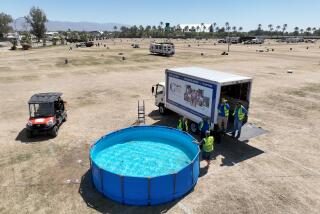1,000 Adults Savor 8th-Grade Diplomas : Education: Many recipients of the LAUSD certificates have dealt with war, political upheaval and poverty, from Azerbaijan to Watts.
Mito Mitov’s first life was a full one. He went to college in his native Bulgaria, and worked 25 years in a steel plant before seeking asylum in the United States.
This month, Mitov marked a milestone in his second life: He passed the eighth grade.
The 49-year-old metallurgical engineer was one of more than 1,000 adults who this year were awarded eighth-grade diplomas, the most modest certificate issued by the Los Angeles Unified Schools’ Adult Education Division.
Pride mixed with embarrassment characterize these graduates, whose average age is 30. Their number includes native English speakers and immigrants, geophysical engineers and housecleaners. Their collective histories embrace war, political upheaval and poverty, from Azerbaijan to Watts.
What they have in common is a white piece of parchment paper in a gold-embossed case, and what adult teacher Marian Blake calls “an Everest” of education still before them.
“I take this life like I am second born,” said Mitov, who left his mother and brother behind in Bulgaria. “I start again from level zero.”
Even the most determined are burdened with the same anxiety, that time may have run out on their hopes.
“It’s like, in my life I’m still short, no matter how much I work and go to school, I’m still missing something,” said James Solomon, a 30-year-old custodial worker still working toward his eighth-grade diploma at Watts Adult Learning Center.
Solomon, who lives with his wife and four children in Inglewood, didn’t meet requirements to graduate, although he attended high school. He returned to school 18 months ago to start his education anew.
Across the Southland this month, students received diplomas at graduation ceremonies that, for some, were tinged with regret.
Svetlana Zeotina, a 56-year-old geophysical engineer from Baku, Azerbaijan, fought back tears as she described the war that drove her from a scientific research institute to a night class for eighth-grade diploma students on the grounds of Reseda High School.
“All my life is broken,” said Zeotina, who is unemployed and lives with her mother and niece in Reseda.
“Eighth grade. Can you believe it?” said another graduate, 29-year-old Erwin Herrera, staring despondently down at his diploma.
Herrera recovered quickly, and explained his plans to get a high school diploma, then a university degree, then a law degree--the same path he had nearly completed before political violence drove him out of Guatemala. He and his father, both former soldiers in the Guatemalan army, now live in Tarzana, and Herrera said he hopes someday to join the military here.
“I am starting all over,” said Herrera. “I don’t know if I have enough time.”
Students wore their best clothes for the ceremonies, and those who could brought family members, who sat through long speeches, in sweltering auditoriums, to see their loved ones’ moment on stage.
“A lot of people don’t think eighth grade graduation is a big deal, until you see this,” said teacher Susan Milton at a North Hollywood commencement. “They work so much harder to do it. Some come six years just to get this.”
“Eighth grade is not a big deal to my family. But it’s a big deal to me, it is very important to me,” said Fereshte Termehi, 41, a college-educated Iranian woman who escaped her homeland on the back of a camel, fleeing through the mountains to Turkey.
Termehi, who got her eighth-grade diploma at Reseda Community Adult School recently, came to the U.S. 1 1/2 years ago, with her three children, and her husband, a high-school math and science teacher.
The family paid the equivalent of $30,000 to escape Iran after Termehi’s husband was jailed for four months because he had tutored in the families of high officials under the Shah, Termehi said. She now works part-time teaching Hebrew in a preschool, but said her attempts to find better-paying work have met with no result.
For Termehi, and other college-educated immigrants who are among the ranks of eighth-grade graduates, learning English is their chief barrier to advancement. But large numbers of the students enrolled in eighth-grade diploma programs are there not just to learn language, but to acquire basic knowledge and math skills that somehow they missed in their adolescence.
And in a time when even college-educated engineers are having trouble getting jobs, these adults have walked a rocky path.
Many are on welfare. Some have spent years working superhuman hours at menial jobs, and a surprisingly large number have managed to find themselves a well-paid niche in those last remaining corners of the economy that do not require a high school, or even junior high school, education.
Stone masonry, carpentry, housecleaning, auto mechanics and restaurant work pack the resumes of diploma holders. One young woman from Thailand said her big break came when she landed a job as a dealer in a Bell Gardens card room.
“You come here, you have to look around and do whatever you can to survive,” said James Alexander, a 21-year-old former accounting student from Costa Rica, who earned an eighth grade diploma from Reseda. For Alexander, who lives alone and said he knows no one here from his country, survival has meant working one job as a waiter, another removing asbestos and going to school five days a week, three hours a night, in between.
“Sometimes I don’t sleep,” he said.
Talking of their decision to return to school, some cited their embarrassment in not being able to read. Others spoke of their difficulty finding jobs, or simple boredom, as reasons for giving education a second try.
“I had been sitting around long enough,” said Demitria Pryor, who was born and raised in Watts, but dropped out of school due to pregnancy in the ninth grade. Pryor fits the mold of most native English speakers in the program, who have completed school past the eighth grade, but tested below an eighth grade level when they returned to school as adults, said Francis Buchanan, coordinator of the Watts Adult Learning Center.
Pryor, 27, an unemployed mother of three, said she’s proud of her eighth grade diploma and has set her sights on completing high school.
LAUSD does not keep statistics of how many eighth-grade diploma recipients go on to earn high school diplomas. But nearly all the graduates interviewed said they planned to continue.
“I’ll keep going if it takes another 20 years,” said 32-year-old Carolyn Taylor, another lifelong Watts resident, who is still working her way up to an eighth-grade diploma and aims to complete high school.
Mitov, the emigre, said a high school diploma is his next goal, too. Threatened with prison after a 10-day hunger strike in Bulgaria, Mitov said he left behind his life as a union organizer for steelworkers and his fight for a shorter workweek. He attends night school on the grounds of North Hollywood High School, and was working as a welder nearby until a recent on-the-job injury.
Now Mitov, whose bald pate is ringed by a fringe of gray hair, is contemplating a future as open-ended now as the day he turned 14.
“If I was now in my country, January 9, next year, I go to pension. . . . Now I need this for my bread,” he said, holding up his diploma.
Few of the graduates seemed free from the the unease felt by Solomon, the custodial worker studying in Watts--that their hopes may founder because of lost time.
“I started school at an older age, and I see these high school kids--they are doing trigonometry,” Solomon said. “I don’t know when I’ll ever be doing trigonometry. You see what I mean? I’m behind time. Being an adult, you’re behind time.”
The eighth-grade diploma affirms that adult students have acquired basic math and reading skills sufficient to enter a high school program.
But the diploma has little value outside the school system. Although it is authorized by the state Board of Education, few employers recognize an eighth-grade certificate, and few other school districts bother to award them, said Tom Bower, consultant for the adult education unit of the state Board of Education.
More to Read
Start your day right
Sign up for Essential California for news, features and recommendations from the L.A. Times and beyond in your inbox six days a week.
You may occasionally receive promotional content from the Los Angeles Times.






